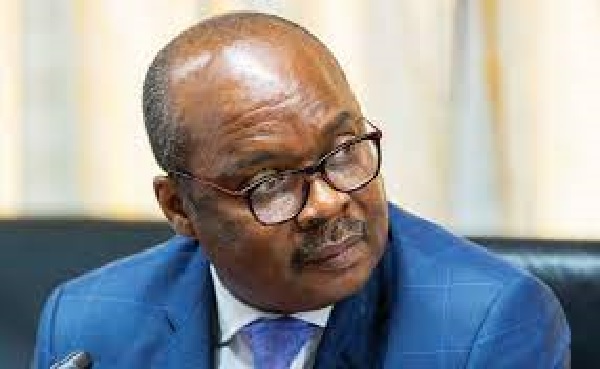
MPC begins meetings next week: Will policy rate stay or increase?
The Monetary Policy Committee (MPC) of the Bank of Ghana will hold its 117th Regular Meeting from Wednesday, March 20, 2024, to Friday, March 22, 2024, to review developments in the economy.
According to a notice posted on the bank’s website, the meetings will conclude with a press conference on Monday, March 25, 2024, to announce the decision of the committee.
A key consideration will be the monetary policy rate which is currently pegged at 29 per cent having been reduced by 100 basis points from 30 per cent.
The bank, in explaining its decision for reducing the policy rate, premised its decision on two key developments: external buffers and inflation.
Advertisement
External buffers
For instance, the central bank said the country’s external buffers had increased, providing support for exchange rate stability.
Improved forex inflows from the International Monetary Fund External Credit Facility (IMF-ECF) disbursements, receipt of the cocoa syndicated loan, and expected funding from the World Bank’s Development Policy Operations were expected to improve foreign exchange inflows.
In addition, the bank said its gold for reserve programme, repatriation of foreign exchange from the mining and oil companies, and reduction in debt service payments would further support reserve build-up and improve the external sector outlook.
Inflation
Headline inflation declined sharply by more than 30 percentage points in the course of 2023. It said several factors supported the disinflation process, namely the tightening monetary policy stance throughout 2023, favourable international crude oil prices which led to stable ex-pump prices and transportation costs and relative stability in the exchange rate.
It said the latest forecast at the time suggested that the disinflation process would continue, and headline inflation was expected to ease to around 13-17 per cent by the end of 2024, before gradually trending back to within the medium-term target range of six-10 per cent by 2025.
These forecasts notwithstanding, the bank acknowledged that there were upside risks to the inflation outlook and there was the need for strict implementation of the 2024 budget and a tight monetary policy stance to sustain the disinflation process.
The bank further noted the emerging recovery but was cautious as it stated that it saw the need to maintain a strong policy stance to consolidate the disinflation gains, hence the reduction in the policy rate by just 100 basis points to 29 per cent.
Emerging trend
The present turn of events within the economy is tricky and will place the MPC in a tight corner as to whether to maintain the rate of increase by another 100 basis points to where it dropped to 29 per cent.
Just as the bank predicted, many analysts also expected that the improved forex inflows from the International Monetary Fund External Credit Facility (IMF-ECF) disbursements ($600m), receipt of the cocoa syndicated loan, and expected funding from the World Bank’s Development Policy Operations were to improve foreign exchange inflows, a development which was expected to help stabilise the cedi over a longer period.
Shaky developments
Unfortunately, the cedi has not been able to hold its own against the dollar and the other major foreign trading currencies.
Consecutive estimates indicate that the local currency has depreciated by about six per cent, year to date, particularly against the American greenback with no sign of stabilising any time soon.
Again, there is no indication of any new significant inflows from external sources, at least not until the latter part of the second half of the year to cushion the cedi.
Inflation which trended downwards has started rising again, albeit marginally.
It resumed an upward trend having declined for five consecutive months towards the end of last year.
The general price levels increased marginally from 23.2 per cent in December 2023 to open the year with a rate of 23.5 per cent in January.
After reaching a 22-year high of 54.1 per cent in December 2022, inflation started declining in 2023, reaching 23.2 per cent in December 2023.
Presently, the shaky cedi has forced an increase in petroleum products with petrol and diesel, for instance, selling at an average of GH¢12.94 and GH¢13.94 respectively at the pumps.
As a result, transport owners are contemplating an increase in transport fares to compensate for the increase in petroleum products.
The Ghana Union of Traders Association (GUTA) also hinted at price hikes on imported goods because of port charges which were always pegged to the dollar.
All these are a threat to the inflation outlook.
Conclusion
Earlier before the announcement of the previous policy rate, many, particularly businesses, were those who pushed for a more drastic reduction.
But the wisdom behind the decision of the central bank to reduce the policy rate by just 100 basis points is beginning to play out.
The bank had indicated that the forecasts as earlier mentioned notwithstanding, there were upside risks to the inflation outlook and stressed the need for strict implementation of the 2024 budget and a tight monetary policy stance to sustain the disinflation process.
With these latest twists in the economy, the policy rate will likely either stay the same at 29 per cent as the bank keeps a close eye on the developments or the rate will revert to 30 per cent to mop up excess liquidity in the system until things mobilise.
With bated breath, all await to see what the MPC stands to announce after its week-long deliberations on developments within the economy.

